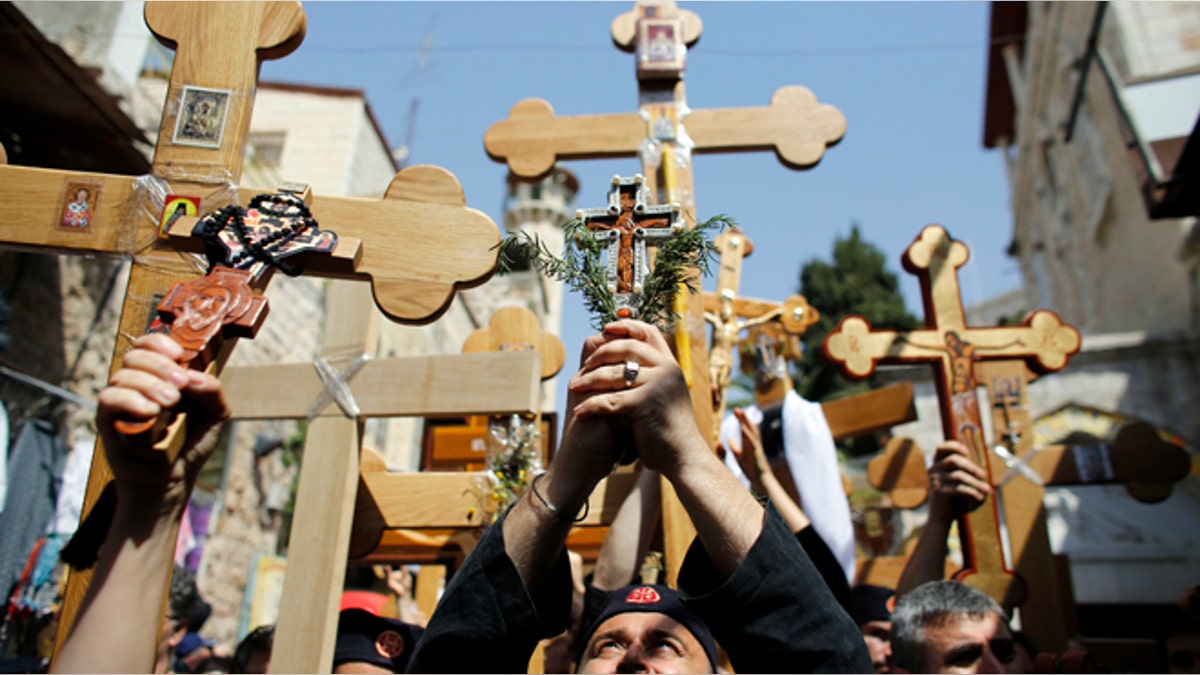
Orthodox Christian worshippers hold crosses as they take part in the Eastern and Orthodox Church's Good Friday procession along the Via Dolorosa in Jerusalem's Old City. (Reuters)
Patience is in short supply these days. Despite our instant communication capabilities, just about everyone is waiting for something. The phone doesn’t ring. The cable guy never shows up. A check is always “in the mail.”
Last week I found my own patience stretched into a thin membrane by a pile of complaints – thankfully small ones. But mostly I was struck by the inevitable silence of waiting. When we’re hoping for answers, no news is far from good news.
[pullquote]
And in fact, it was bad news that distracted me from my own woes as a headline scrolled down my iPhone. “Asia Bibi appeal hearing postponed.”
Asia Bibi is a Pakistani Christian, and her name is familiar to those of us who follow international human rights. Her story is almost unbelievable – and all too true:
“In June 2009, Asia was involved in an argument with a group of Muslim women with whom she had been harvesting berries, after the other women became angry at her for drinking the same water as them. She was subsequently accused of insulting the Islamic Prophet Muhammad, a charge she denies, and was arrested and imprisoned. In November 2010, a Sheikhupura judge sentenced her to death. If executed, Asia would be the first woman in Pakistan to be lawfully killed for blasphemy.”
Many have spoken out on Asia Bibi’s behalf, including Pope Benedict. Two prominent Pakistanis, Shahbaz Bhatti, Minister for Christian minorities, and Salmaan Taseer, Governor of Punjab, were assassinated in 2011 for opposing Pakistan’s notorious blasphemy laws on her behalf.
Nonetheless, since 2009, this falsely accused woman has been on death row in a filthy prison cell, wondering if and when her death sentence will enforced. She longs for husband and five children. Day and night, in squalid surroundings, she fights off her fears, endures physical illness and prays.
Unsure if she will live or die, Asia Bibi waits.
Another story emerged last week from Iran, about US-citizen and former Muslim Pastor Saeed Abedini, who is serving an eight-year sentence because he “undermined the Iranian government by creating a network of Christian house churches and ... attempting to sway Iranian youth away from Islam."
Despite urgent requests for medical care – his body is internally wounded from abominable prison conditions including beatings and torture – he was denied treatment. Eventually, presumably under pressure from several international organizations’ outcry, Abedini was taken to a medical center, unshackled and even permitted a brief visit from a family member.
What happened after that? Once the encouraging proceedings passed, Abedini was still in pain, still bleeding from internal injuries. He remains hospitalized but untreated. Like Asia Bibi, he is the focus of much international prayer and non-governmental activism. Even the EU has spoken up, as has President Obama. But Abedini is entirely unsure about the future. Will he see his wife and two small children again? Will he live or die? He has been behind bars since September 26, 2012.
The family watches and keeps faith. Concerned people post and tweet and pray.
And day in, day out, Saeed Abedini waits.
Other captives are waiting, along with their loved ones, in Egypt. According to my friend and colleague, Coptic scholar Samuel Tadros, the big stories of church burnings and murdered Christians have diminished somewhat under Cairo’s new military regime.
But less publicized evils remain. Most notably, kidnappings are rampant. On March 20, MidEast Christians News reported that two young women, 17 and 18, were abducted in separate incidents just days before.
Coptic World observed, “Coptic children or adults abducted at gunpoint and held (and sometimes killed or forced to convert to Islam) by “unknown persons” in exchange for money—are on the rise in Egypt…”
Muslim kidnappings of Christians are also taking place in Iraq, Syria, Pakistan and beyond. Captives are often raped, beaten, forcibly married, starved and eventually, if financial terms aren’t met, murdered.
Meanwhile, the victims’ loved ones worry, weep and console each other. Of course, like all believers they pray, recalling the ancient promise:
But they that wait upon the Lord shall renew their strength; they shall mount up with wings as eagles; they shall run, and not be weary; and they shall walk, and not faint (Is 40:31).
So hoping against hope, they wait.
Christians are the most persecuted religious group in the world and abuses have surged exponentially in recent years. At the same time, the United States government, once a global champion of religious freedom, offers dwindling intervention.
Reliance solely on the nations of the world to act, diplomatically or politically – with rare and notable exceptions – will likely result in the longest wait of all.
And waiting is agonizing.
